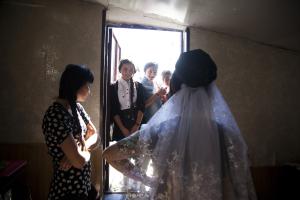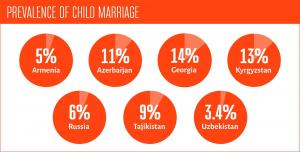
Early marriage in Eurasia. Photographer: Daro Sulakauri

Photographer: Daro Sulakauri

Child marriage rates in Eurasian countries
Gaps in laws, weak legal enforcement, and cultural acceptance drive bride kidnapping and child and forced marriage in Eurasia, finds new report by Equality Now.
— Tamar Dekanosidze, Equality Now’s Regional Representative in Eurasia
BAKU, AZERBAIJAN, October 16, 2024 /EINPresswire.com/ — Child, early, and forced marriages (CEFM) remain a pervasive and under-addressed issue in Eurasia, with girls and young women from lower-income households, rural areas, and conflict-affected regions experiencing considerably higher rates, finds a new report by Equality Now.
‘Breaking Barriers: Addressing Child, Early And Forced Marriage In Eurasia’ examines seven Eurasian countries – Armenia, Azerbaijan, Georgia, Kyrgyzstan, Russia, Tajikistan, and Uzbekistan – and reveals how legal and policy frameworks often fail to provide effective protection.
Girls are far more likely than boys to be married off at younger ages. Widespread acceptance of CEFM, social stigma directed at survivors, and inadequate responses from authorities mean perpetrators routinely face little or no consequences. Support for survivors and sanctions against perpetrators of forced marriage are frequently inadequate. Suspended sentences or fines are common, undermining the law’s deterrent effect.
Gaps in legislation, weak law enforcement, underfunding, and a lack of political will are critical issues. The majority of countries examined do not have specific national action plans or policies to tackle CEFM. While Kyrgyzstan has comprehensive measures, more action is needed to translate them into actual impact.
Dariana Gryaznova, Eurasia Legal Advisor for Equality Now, says, “Child, early, and forced marriages remain one of the most pressing human rights violations facing girls and women across Eurasia. Governments urgently need to strengthen legal protections, ensure laws are rigorously enforced, and commit the necessary resources to end CEFM.”
CHILD MARRIAGE IN EURASIA
All seven countries have taken steps to reform CEFM laws, but only Georgia and Azerbaijan have set the minimum age of marriage at 18, without exception. The others retain legal provisions permitting marriage under 18 with parental consent and/or local authority approval. In several regions of Russia, marriage is allowed at 14.
The rate of officially registered marriages involving minors varies significantly between and within countries. Georgia has the highest prevalence, with 14% of women aged 20 to 24 married before 18, rising to 25% in rural regions like Kvemo Kartli. Kyrgyzstan also has a high rate, with approximately 13% of women in the same age bracket marrying below 18.
At 3.4%, Uzbekistan has the lowest child marriage rate and has achieved a significant decline over the past decade. However, prevalence in the Eastern
region remains at 11%.
Armenia has a child marriage rate of 5% and is among the top ten countries worldwide for reducing the practice. Despite progress, child marriage remains prevalent within the Yezidi community, where girls as young as 13 or 14 are married off.
CEFM is higher in some marginalized ethnic minorities, and this intersects with challenges they face, such as discrimination, social exclusion, poverty, language barriers, and being located in geographically remote areas.
This has fostered a desire among certain members of ethnic communities to protect their culture, with traditions such as child marriage perceived as a way to uphold group identity and honor. This maintains a cycle of early marriage being both a cause and consequence of socio-economic disadvantage.
Economic factors and poverty also play a significant role, with the possibility of alleviating financial pressures sometimes incentivizing parents to marry off their daughters.
FORCED MARRIAGE AND BRIDE KIDNAPPING
Abduction for forced marriage – sometimes referred to as bride kidnapping – occurs in Armenia, Azerbaijan, Georgia, Kyrgyzstan, and Russia.
In Kyrgyzstan, for example, following the Soviet Union’s collapse, there was a resurgence in forced marriage and bride kidnapping among Kyrgyz men seeking to reassert their masculinity and reclaim cultural identity amidst social and economic upheaval. Although Kyrgyzstan outlaws such practices, weak legal enforcement and cultural acceptance mean few cases are prosecuted, and this relies on law enforcement’s discretion.
Many victims say their families facilitated their abduction or pressured them to stay with their kidnapper. However, some report support from parents, especially in cases involving underage daughters or perpetrators with criminal backgrounds.
Gaps in legal protections are a contributing factor. Forced marriage in Armenia, Azerbaijan, Russia, Tajikistan, and Uzbekistan is not explicitly criminalized and falls under general provisions that don’t recognize the gendered nature of these crimes. Perpetrators in Azerbaijan and Russia are exempt from criminal liability if they voluntarily release their victims.
FEAR, STIGMA, AND INADEQUATE SUPPORT LEAD TO UNDERREPORTING
Forced marriage regularly goes unreported. Girls rarely turn to law enforcement as they are expected to accept their situation and, if a family member is involved, to not speak against them. In Uzbekistan, silence is reinforced by the normalization of arranged marriages and the belief parents should decide their children’s marital future.
A lack of trust in authorities, limited awareness about legal protections, and insufficient support services prevent women and girls from coming forward. With “honor-based” crimes still occurring in some communities, CEFM victims usually remain silent, fearing blame and retaliation.
Once abducted, refusing marriage after spending time at a man’s home – which often results in rape – can irreparably damage a victim’s reputation, compelling her to marry her captor to avoid societal judgment, family shame, or reprisals from the perpetrator or community. Forced marriage perpetuates child marriage as worry about abduction prompts families to marry daughters early to “protect” them.
In Georgia, despite criminalization and efforts to end forced marriage, it continues in regions with minoritized communities. While the law doesn’t view reconciliation as a basis for terminating investigations, prosecutions, or deciding against initiating prosecution, in reality, it’s frequently used to dismiss cases.
GOVERNMENT ACTION IS NEEDED
Equality Now urges governments to adopt a multi-sectoral approach underpinned by strengthening legal frameworks and implementation. Setting the minimum age of marriage at 18, without exceptions, is essential.
Regional trends intersect with each country’s distinct social, historical, economic, and legal context. CEFM remains entrenched in these complex landscapes, shaped by traditions, religion, and ethnic and gender discrimination. The absence of reliable, disaggregated data hinders intervention efforts. Governments must improve data collection to measure CERM fully. This includes gathering details on sex, age, ethnicity, and other relevant factors, enabling better strategy development, enactment, and evaluation.
Educating communities on CEFM’s harms and laws, and providing well-funded, specialist support services like shelters, counseling, and legal aid are integral to transformative change. Governments should also consider financial incentives for families to discourage child marriage and keep girls in school.
Tamar Dekanosidze, Equality Now’s Regional Representative in Eurasia, concludes, “Law reform is vital, but lasting change also requires tackling the underlying factors that sustain child, early, and forced marriage. That’s why Equality Now calls on governments to implement multi-sectoral strategies that close legal loopholes, enforce laws, engage communities, and provide women and girls with the comprehensive support they need.”
*******************************************************
About: Equality Now is an international human rights organization dedicated to protecting and promoting the rights of all women and girls worldwide. Its work is organized around four main program areas: Achieving Legal Equality, Ending Sexual Violence, Ending Harmful Practices, and Ending Sexual Exploitation, with a cross-cutting focus on addressing the unique challenges faced by adolescent girls.
Equality Now combines grassroots activism with legal advocacy at the international, regional, and national levels to achieve systemic change, and collaborates with local partners to ensure governments enact and enforce laws and policies that uphold women’s and girls’ rights. For more details go to www.equalitynow.org
Tara Carey
Equality Now
+44 7971 556340
[email protected]
Visit us on social media:
Facebook
X
LinkedIn
Instagram
YouTube
Legal Disclaimer:
EIN Presswire provides this news content “as is” without warranty of any kind. We do not accept any responsibility or liability
for the accuracy, content, images, videos, licenses, completeness, legality, or reliability of the information contained in this
article. If you have any complaints or copyright issues related to this article, kindly contact the author above.
![]()
Article originally published on www.einpresswire.com as Discrimination, poverty, and weak legal protection fuel child & forced marriage in Eurasia




